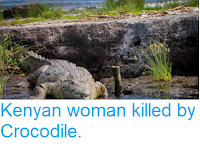A woman is being treated for severe injuries following an attack by a Crocodile in Kendrapara District, Odisha, on Saturday 27 October 2018. The woman, identified as Chhaila Das from the village of Balabhadraprasad was attacked by a five meter long Saltwater Crocodile, Crocodylus porosus, while bathing in a stream near her home. She was initially treated at a local medical centre, before being transferred to the SCB Medical College and Hospital in Cuttack, where her condition is described as critical.
A Saltwater Crocodile, Crocodylus porosus, in the Bhitarkanika National Park in Kendrapara District, Odisha. Anubhav Sarangi/Wikimedia Commons.
Crocodile attacks on Humans are relatively rare, but they are
opportunistic ambush predators and will potentially attack anything
going close to the water. Saltwater Crocodiles have a particularly poor
reputation for such behaviour, being the largest species of Crocodile
and notoriously aggressive. These Crocodiles are one
of the few Crocodile species not considered vulnerable to extinction,
being found from India to Australia and inhabiting many areas that
Humans shun, such as Mangrove forests and islands without fresh water.
The attack occurred close to the Bhitarkanika National Park, which is home to a population of about 1700 Crocodiles, leading to the potential for conflict with humans. The Indian Forest Service
has placed barriers along the Bramahani, Kharosotra, Hansua and
Baitarani rivers in and around the park, and issued warnings to
villagers not to enter the water, though it is unclear to what extent
this is a realistic expectation. Local villagers claim an average of
about six people are attacked by Crocodiles in the area each year,
though the majority of these attacks go unreported, as people simply
disappear.
See also...
Follow Sciency Thoughts on Facebook.







